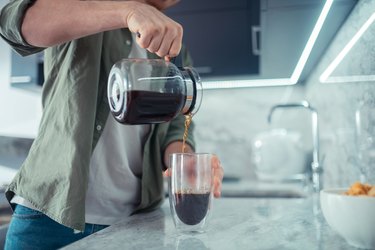
You can have your cuppa joe and good sex, too. Research to date shows there's little risk that caffeine, like that found in coffee or energy drinks, can cause erectile dysfunction. In fact, the stimulant (in moderation) may even help.
There's no evidence caffeine intake in any form ups the risk for erectile dysfunction (ED), says Katrina Hartog, RDN, director of clinical nutrition at Mount Sinai West in Brooklyn, New York.
Video of the Day
Video of the Day
"Erectile dysfunction is the most common sexual complaint in males," she says. And when ED takes hold, it "can lead to negative individual functioning, difficulty with relationships and lower quality of life." And that means a lot of effort has, in fact, gone into exploring possible factors that may influence risk.
An April 2015 study in PLOS One found 85 percent of adults consume caffeine in some form, and more than 18 percent of men ages 20 and up experienced ED.
A Note on Language
Here at LIVESTRONG.com, we believe sex and gender are spectrums. We typically use inclusive language when it comes to sex and gender, but we're using the terms used by the primary sources cited and quoted throughout this article.
Cigarettes and ED Risk
Hartog points to the findings of a large April 2018 review in the Journal of Sexual Medicine (JSM). That analysis, Hartog says, "identified 89 [prior] studies, and reviewed whether cigarette smoking, physical activity, alcohol intake, caffeine intake or cannabis use were associated with sexual dysfunction."
In the end, she notes, the JSM study concluded some of those lifestyle factors, such as cigarette smoking, did indeed appear to raise ED risk, while others — such as physical activity and even moderate alcohol consumption — appeared to lower it.
"In terms of caffeine intake," Hartog says, "the analysis showed this was unrelated to sexual dysfunction."
That said, a large May 2018 study in the American Journal of Epidemiology (AJE) did find indications that drinking decaf coffee could be associated with an increase in ED risk. However, the study team noted that the association was most strongly seen among those decaf drinkers who also smoked, which led the investigators to question whether any related rise in ED risk might be a function of cigarettes, rather than decaf coffee.
And on the caffeinated coffee front, the AJE study similarly found no evidence of a connection of any kind to a heightened risk for ED.
Caffeine Might Even Lower Risk for ED
"There has been some research suggesting that moderate amounts of caffeinated coffee — say a couple of cups per day — may actually help reduce ED risk," says New York City-based registered dietitian and senior clinical nutritionist Samantha Heller, RD.
The 2015 PLOS One study is one such effort. Among men ages 20 and up, drinking roughly 2 to 3 cups of caffeinated coffee per day — meaning between 170 to 375 milligrams of caffeine — was associated with lower odds for ED.
The finding held up for men with overweight or obesity and/or those with high blood pressure, though the beneficial connection was not seen among men with diabetes.
But, despite these promising results, for the time being, Hartog remains unconvinced of caffeine's purported protective benefit for ED.
"Caffeine," she says, "is often marketed for its physical and cognitive performance benefits. But further research into caffeine intake and its effect in this arena would be needed to draw any specific conclusions or make clinical recommendations."
More Caffeine Is Not Better
Heller cautions that too much coffee can still have an undesirable effect on one's sex life — even if it doesn't play a direct role in elevating ED risk.
"I think people who are concerned about ED specifically are probably fine if they want to drink their caffeinated coffee or energy drink," Heller says. "But if one consumes an excessive amount of caffeine in any form, that clearly can make that individual anxious, cranky and jittery. And all of those things can certainly affect one's ability to have sex or even one's interest in it."
- Katrina Hartog, MPH, RD, CDN, director, clinical nutrition, Mount Sinai West, Brooklyn, New York
- Samantha Heller, MS, RD, senior clinical nutritionist, New York University Medical Center, New York, New York
- American Journal of Epidemiology: “Coffee Intake and Incidence of Erectile Dysfunction”
- Journal of Sexual Medicine: “Health-Related Lifestyle Factors and Sexual Dysfunction: A Meta-Analysis of Population-Based Research”
- PLOS One: “Role of Caffeine Intake on Erectile Dysfunction in US Men: Results From NHANES 2001-2004”
Is this an emergency? If you are experiencing serious medical symptoms, please see the National Library of Medicine’s list of signs you need emergency medical attention or call 911.